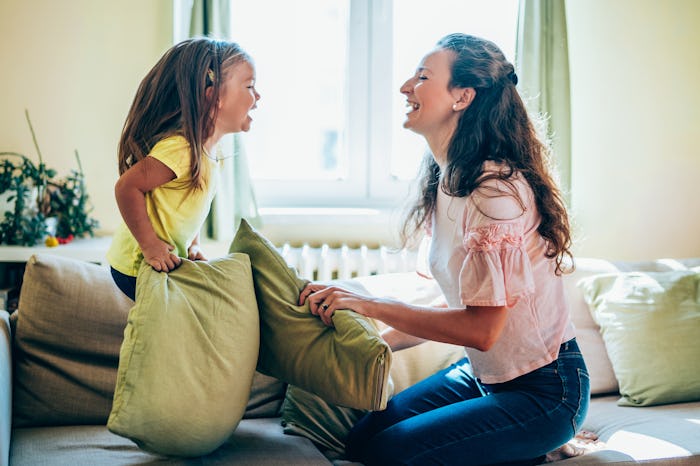Life

If You *Need* A Babysitter During Quarantine, Here's What Experts Want You To Know
If you’re working from home with young children, most people are probably thinking at least a couple hundred times a day, I need my village. Especially when you’re on conference calls and your kid decides at that precise moment to run in front of the computer and scream, “I want to be naked!!!” But when is it safe to have a babysitter during quarantine? Unfortunately, there are quite a lot of factors that come into play as to whether or not it’s safe to have some additional help at this time. And while there is no set “safe time” as to when you can hire a babysitter during quarantine (unless you count when this whole thing is over), if you must have help, there are definitely some precautions you have to take to ensure everyone’s health and safety.
To start, you need to make sure hiring a caregiver doesn't violate any orders and that a babysitter or nanny is considered an essential job in your state. Andrew Roszak, executive director of the Institute for Childhood Preparedness with more than 20 years of experience in pandemic preparedness, tells Romper, “Across the country, the governors have plenary power to determine, implement, and enforce public health measures. This means that ultimately each state is allowed to determine who is and who is not essential. The Institute for Childhood Preparedness has developed a national dashboard to help visualize the approaches that states are taking. As of April 13, 2020, only five states have not deemed child care as an essential business.”
But Roszak warns, “If you are seeking to use a babysitter, I would suggest learning more about his/her movements and interactions with other individuals.” Roszak says that it would be safest to find a babysitter that has had little to no contact with other individuals, because that would drastically reduce the likelihood that they’re infected. Dr. Snehal Doshi, a board-certified pediatrician and CEO of Millennium Neonatology adds, “If the nanny or babysitter lives in your house with you, and their exposures are the same as yours, then that is the safest. However, if they come and go, then the risk goes up. We cannot control what they do outside of your home, so that makes things hard.”
Doshi says that if you do hire a babysitter or nanny, it’s imperative that you ask them to use “standard precautions, like a mask and good hand washing hygiene when they are out and about, to minimize the risk for themselves and to you.” Additionally, Doshi says, “Maybe have them take groceries from your house so that they aren't having to go to the store for themselves, use your washer/dryer so they do not have to go to a laundromat, pick them up from their homes if they do not have a car or if they ride public transportation.”
Doshi also says that while this isn’t legal advice, “a request for the babysitter to limit their exposures to high risk environments is within reason. However, they have no legal obligation to follow your requests unless it is in the terms of your contract.” He adds that you’re also allowed to ask your babysitter routine questions like have they been around sick people or someone with a fever, or if they've traveled to a high-risk area. “Taking their temperature and making sure they do not have a fever is also a very good idea. If they have a fever more than 100.4 degrees Fahrenheit, they should be sent home,” he says.
But it's also extremely important to remember that research has shown that coronavirus can be spread by those who are asymptomatic, Roszak says. “Given this new research, it is impossible to say with 100% confidence that any human contact is ‘safe.’ Once widespread testing becomes available, this will change as we will be able to quickly identify who is infected and who is not,” he adds.
Truly, this is a family decision to make. It sounds like it's best to try and tough it out without a nanny or babysitter, but if you absolutely need one, please take precautions. See if a family member can come stay in your home with you to limit exposure in and out of the house, or find someone you can trust that will take their temperature each day and wear a mask. There's no easy answer here, but there are ways to help keep everyone safe.
Experts:
Andrew Roszak, executive director of the Institute for Childhood Preparedness with more than 20 years of experience in pandemic preparedness
Dr. Snehal Doshi, a board-certified pediatrician and CEO of Millennium Neonatology
This article was originally published on